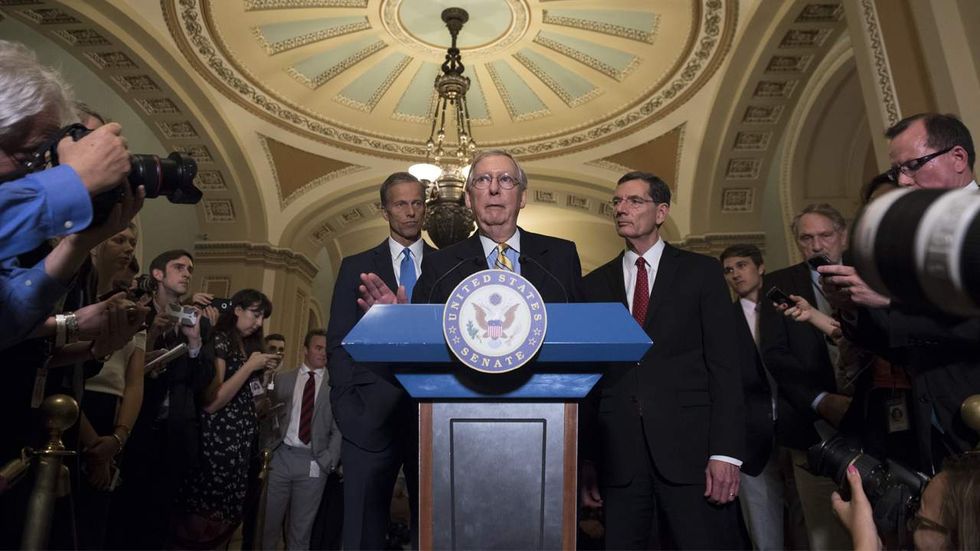
A new health care reform proposal offered by three Republican senators could be Senate Republicans’ last hope at passing a health care reform bill to replace Obamacare without relying on Democratic Party senators. (Saul Loeb/AFP/Getty Images)

A new health care reform proposal offered by three Republican senators could be Senate Republicans’ last hope at passing a health care reform bill to replace Obamacare without relying on Democratic Party senators, who will likely refuse to make substantial changes to the existing system.
Sens. Lindsey Graham (R-S.C.), Bill Cassidy (R-La.) and Dean Heller (R-Nev.) met with President Donald Trump and top White House officials on Friday to discuss their plan, which they believe could get the approval of 50 senators, according to a report by Politico. Although the details of the proposal are not entirely clear and are still in development, the basic outline of the proposal is the funds currently provided by the federal government for Medicaid and Obamacare would be provided to the states in the form of block grants.
Block grants are funds given to states with limited strings attached, allowing states to determine how best to use the money. By block granting Medicaid and Obamacare funds to states, both conservatives and moderates could be appeased, because conservative states would implement programs that promote pro-liberty, free-market policies while more liberal states would likely keep much of Obamacare in place, although all states would have great freedom in choosing how to use their share of the federal funds.
It’s not clear from the information that’s been released so far what the associated requirements would be. For instance, would states be allowed to use funds to pay for abortions? Must states continue to force health insurance companies who provide subsidized coverage to provide the costly ACA essential health benefits?
Greater flexibility would likely appeal to conservative senators, such as Rand Paul (R-Ky.), Ted Cruz (R-Texas) and Mike Lee (R-Utah), but it could alienate some moderates, such as Susan Collins (R-Maine), who might not want states to have the freedom to restructure their Medicaid programs.
The downside to such a model, from a conservative perspective, is more-liberal states, such as California, Illinois, New York and Vermont, will likely expand government’s role in health care using federal taxpayer funds. Runaway Medicaid costs and other government funding concerns would also continue to plague the health care system.
However, despite these challenges, Graham, Cassidy and Heller believe this could be the only chance for Republicans to replace Obamacare, and it’s true that once states are given this kind of flexibility, it’s likely they will fight to keep it.
“I had a great meeting with the President and know he remains fully committed to repealing and replacing Obamacare,” Graham said in a written statement released on Friday. “President Trump was optimistic about the Graham-Cassidy-Heller proposal. I will continue to work with President Trump and his team to move the idea forward.”
“The legislation was also drafted hand-in-hand with our governors who would be responsible for implementing solutions in their individual states – and who know their citizens better than the bureaucrats in Washington,” Graham added.
“One of the biggest benefits of this approach is it will end the drive toward a national single payer health care system by taking money and power out of Washington and returning it to the people,” Graham said.
Justin Haskins